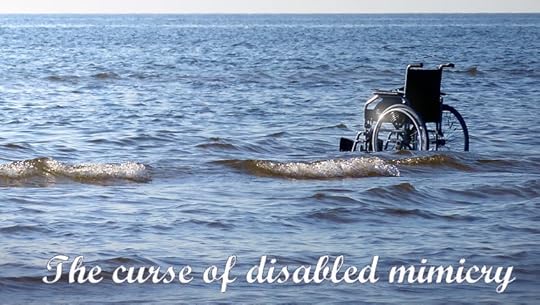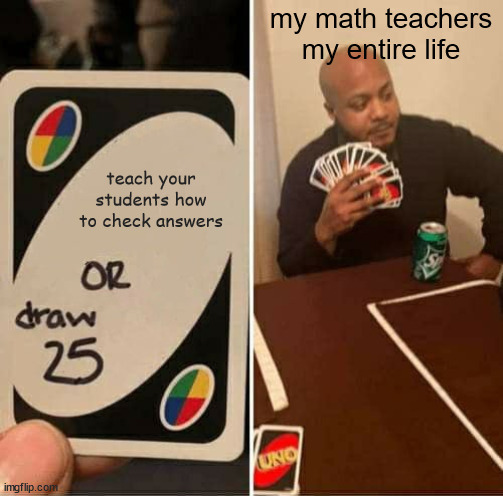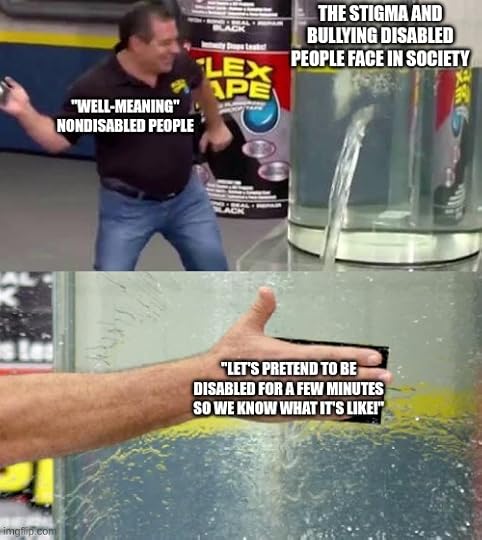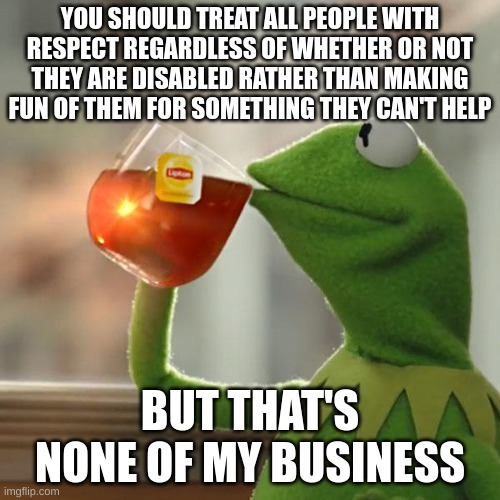Autism Simulator
“What’s it like to be autistic?”
I don’t know. What’s it like to not be autistic? For the non-autistic reader, that’s “normal.” You’ve always experienced the world the way you have, just as I’ve always experienced the world autistically. I don’t know what it’s like to be not autistic, so I can’t say what it’s like to be autistic. It’s just how I’ve always been. Which is why I hate the word “normal” in any context that is not referring to Pokemon types.

Sometimes when someone (usually able-bodied and neurotypical) is trying to do disability activism (also known as ability awareness), they’ll have able-bodied people sit in a wheelchair, or make hearing people use earplugs, or ask seeing people to wear a blindfold, to experience what it’s like to be “disabled.” In the case of autism, I’ve seen a (non-autistic) person try to teach non-autistic sixth graders what autism is really like. (this person who led the lesson is a special education teacher with 20+ years of experience working with autistic children and young adults) She had one of the (neurotypical) students come to the front of the classroom to work on a set of simple math problems. While he was doing those, she had two other students stand on either side of him and yell loudly at him. Then she would, every few seconds, say things like “You’ve only got 30 more seconds to work on this!” or “C’mon, you know how to do this!” and various other prompts. After a couple of minutes, she had them all stop and the student doing the math problems talked about how hard it was to work on the math while everything else was going on around him. But that’s not technically what autism is.

Let’s use that same example: you’re in sixth grade taking a math test. You come in already with building anxiety about the test (you’ve always been good at math, but you know you’re going to do something wrong, like put the answers in the wrong spot or not write them clearly enough for the teacher to read, and she’ll think you wrote an 8 when you really meant to write a 3 and take points off). The lights in the classroom are weird, and they glare off the top of your desk and hurt your eyes. The seat feels so cold on the back of your legs, and you wore the wrong socks today so your foot is uncomfortable and your sock is slipping down on the wrong part of your ankle. You can feel all your toes inside your socks and it’s almost painful. In order to be comfortable, you have to tuck one leg up underneath the other as you sit, but the teacher tells you no, you have to keep both feet on the floor. You just started wearing a bra, so you’re not used to the sensation and you can’t focus on anything except how it feels on your chest, but no one else in your grade wears a bra yet so you feel really self-conscious about your breasts. The kid seven tables away from you is writing very loudly with his pencil and it hurts your ears. Someone else near you coughs and you start feeling anxious that they’re sick and you’re going to catch whatever they’ve got. You manage to do a few of the math problems, but then you start doubting yourself: is twelve times four really 36? You learned that fact so long ago, after all. They might have changed the rules for math! And now your stomach starts to hurt, which you read recently is a symptom of appendicitis, and oh no, now you’re anxious that your appendix is about to explode and you’re going to need to go to the hospital! And this anxiety only makes your stomach hurt even more, which only makes you more worried about your appendix, which then causes a vicious spiral of intrusive thoughts in your head: someday you’re going to die and the time you spent on this math test will have been meaningless. So what is even the point of doing math? Who cares if you know that x is greater than or equal to 41 in this one specific instance?
Somehow, you finish all the math problems, but everyone else is still writing. Wait, but why? Did you miss a page? Did you skip a problem somewhere? You frantically flip back through your test, trying to figure out what you missed. Because after all, if everyone else is writing still, you need to be writing, too! Finally, you see that you did, in fact, get to all the problems. Now what do you do? When you’re finished with your assignment, you can read a book. That’s what your teacher always says when you’re doing other classwork. You happily unzip your backpack, unaware that everyone else still taking their test is now glaring at you for making noise, and pull out your book–Ella Enchanted, which you’ve read at least twenty times by now and know the whole story by heart. Since you know the whole story already, you don’t need to feel anxious about what’s coming next! You open it to where you last left off–Ella is plotting her daring escape from finishing school to go find Lucinda–only for the teacher to come over to your desk and pick up your test. Uh oh, are you in trouble? But you did all the problems, and you’ve always been allowed to read once you’ve finished your work!
“Did you go through and check all your answers?” the teacher asks. You have no idea what she means by this, but you slowly close your book and put it back in your backpack–what a cruel book owner you are, to subject your book to the darkness of your backpack once more! As the teacher moves away again, you attempt to “check” all your answers. Taking her at her word, you write a check mark next to each problem because surely that’s what she wants. The teacher comes back over and you give her your test, satisfied that you’ll get 100% because you “checked” each of your answers. But when you get it back the next day, you only got an 86, and the teacher wrote at the top You need to double-check your answers next time!
The confusion between what your teacher said to you and the result you got from it builds up inside of you until you want to scream, and you start crying because everyone else seems to know exactly what to do, and the kid next to you who never pays attention got a 95 even though you’re way better at math than him! But then when the teacher asks you why you’re crying, you can’t explain your frustration because the words just won’t come out.

That’s just a small example of what it’s like to be in my brain. Well, that’s also the worst-case scenario; sometimes when taking tests in school I would be able to ignore the glare from the lights or the feeling of my socks on my feet. But the reason I’m not a fan of “let’s pretend to be disabled for a few minutes so you can learn what it’s like!” is because of three reasons. One, it feeds into “disabled mimicry,” a concept in popular media where a non-disabled actor will be cast to play the role of a disabled character (and get a Golden Globe or an Emmy for it!) and portray the disability in a harmful, stereotypical way. But at the end of the day, the actor doesn’t stay disabled. They get to go home and use their own two legs again, without a wheelchair. They get to ignore all the sounds going on around them and be able to know what the rules are for social situations. They get to “take off” the disability. Unfortunately, this phenomenon has led to a lot of (non-disabled) people thinking that disabled people are just “faking it,” especially when it comes to invisible disabilities like autism.

The second reason I don’t like these is because it’s often not correct. In the example I gave above of the special education teacher doing an “autism simulation,” it wasn’t truly what being autistic is like so it gave the students an inaccurate representation of how I experience the world. The participants of these activities also don’t experience the more difficult aspects of living with a disability: the stigma, the bullying, the uncertainty about your future, the knowledge that you’re just a burden on your friends and family, the self-doubt, etc. And honestly, those able-bodied neurotypical participants will never experience that stigma, not unless later on in life they become disabled in some way.

Reason number three is a very simple one, and the most important: it gives the impression that the disabled person is responsible for how others perceive them, rather than the responsibility being on the nondisabled people around them to just accept them and provide a welcoming, respectful space. Instead of trying to “experience” what it’s like to be autistic, or use a wheelchair, participants of these sorts of activities should instead be taught to never judge someone if you don’t know them, and how traits that commonly make someone a target for bullying or teasing might actually be the result of a disability, and since we never know if someone is disabled or not, bullying is never okay. If someone gets REALLY excited when talking about insects, they’re not a “nerd” or “annoying” (or even, heaven forbid, the r-word), they might be autistic and wanting to talk about their special interest. If someone doesn’t understand sarcasm, don’t judge them or get angry at them. Say that you were being sarcastic, or rephrase what you were saying so that they will understand. In these sorts of “ability awareness” lessons, instead of the non-disabled participants pretending to be disabled for a few minutes, they should instead be taught to respect all sorts of bodies, all sorts of communication styles, and all sorts of people, regardless of whether or not they know that person is disabled. Because why is it okay to make fun of someone for their autistic traits and force them to disclose their entire medical history just to get a modicum of the respect that they should have had to start with?

This also has been on my mind because recently I’ve been helping out with the neurodiversity club at the school where I teach. Yesterday, they decided to decorate the window of the classroom where they meet with all sorts of cool sayings.

These kids in the neurodiversity club are upperclassmen, and a lot of them are also in other leadership positions (student council, etc.) around campus. But the sixth graders, who come into this classroom to receive services related to their IEPs, and a few of them panicked upon seeing this window, saying that this would only make them a further target for bullying. I had a discussion with them about how, since you don’t choose to be autistic or have ADHD or anything else like that, it’s not your fault, and you didn’t do anything wrong. Therefore, you shouldn’t be afraid to show who you are. If people decide to bully you for being autistic, or ADHD, or anything else, that’s not your fault, and it’s not your responsibility to try and stop it. You shouldn’t feel ashamed of something that you had no control over, and you are not responsible for other people’s actions.
(Update: Despite this lovely window that could have been a great conversation piece, and many of the Gen Ed teachers volunteering to have similar sayings on their windows so ours didn’t stand out as much, our students were so upset that our IEP case manager scrubbed the entire window clean not long after I took this photo.  )
)
But that’s just what I think. If you’re disabled, let me know your thoughts in the comments below!



